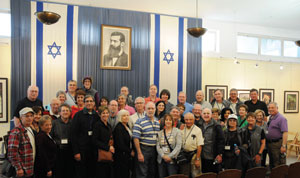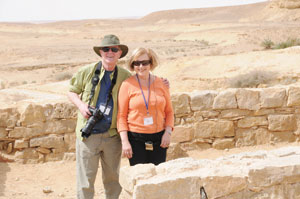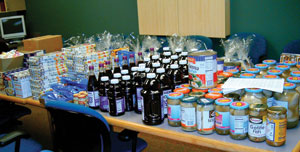Listening Post
JEWISH SUPERFAN — I mentioned KU Superfan Matt Rissien in this column a few weeks ago, but I just can’t resist reporting that he hit the big time early this week. Matt, the son of Aaron and Shelley Rissien and a KU senior, has been dubbed KU’s superfan because he’s frequently in the front row of KU games wearing a Jayhawk fuzzy hat. Like many KU fans he traveled to San Antonio, Texas, last week to cheer for KU in the NCAA tournament. Sadly, KU didn’t win the game, and Matt, as usual, was shown on TV many times. But since KU lost for only the third time this year, and the loss ended the KU season, the camera caught Matt when he was a little down. ABC’s Jimmy Kimmel (or one of his writers) caught the moment also and turned it into a comedy bit for the show. He’s not mentioned by name but the show did air footage, and a few jokes at Matt’s expense. Those who are on Facebook can catch a glimpse of the video at http://www.facebook.com?#!/video/video.php?v+960284614939&commer. (I’m sure there’s another way, but I’m not techno savvy enough to figure it out!) Matt, we hope this doesn’t deter you from wearing the hat in the future!
PREPARING FOR PASSOVER — Those charged with cleaning the house for Passover, shopping for seders and eight days of breadless meals and snacks, and cooking and baking those meals would be a lot more frantic and frazzled if not for the annual OU Guide to Passover. A special issue of Jewish Action, the family magazine of the Orthodox Union, this year’s Guide, for 5771/2011, is now available to help facilitate Passover preparation and observance.
There are also many new and interesting features with beautiful photos accompanying them — and the heart of the guide remains the same: listing food and other products that are certified Kosher for Passover by the OU.
The guide has two basic lists: one with items that must have an OU-P appear on the label, such as baking mixes, baked products, beverages, candy, condiments, dairy products, matzah products, meat and poultry, olive oil, snack food, wine and liqueurs; and one with items that do not need a special Passover certification, such as aluminum foil, candles, cleansers, and paper goods, where the regular OU symbol is sufficient for year-round use.
It can be viewed online http://images.ou.org/files/Pesach2011_.pdf. Hard copies can be ordered as well by contacting or calling (212) 613-8125.
HOLOCAUST HAGGADAH — Last week’s issue (March 25) included a story about Rabbi Berhhard Rosenberg’s new Holocaust siddur. This week we learned that the Kansas City native has also published The Rosenberg Holocaust Haggadah. Like the siddur, it’s available free online. The 143-page book can be downloaded from any computer for free and printed anywhere. Prayers are included in Hebrew, Hebrew transliteration and English translation. It can now be found at www.holocausthaggadah.com.
PADDY CHAYEFSKY’S “GIDEON” — At least two local Jewish actors will be taking part in a one-time only reading of Paddy Chayefsky’s “Gideon.” (Chayefsky was Jewish as well.) It will be presented by EARTh (Equity Actors’ Readers’ Theatre) at 7:30 p.m. Monday, April 11, at St. Teresa’s Academy, located at 5601 Wyandotte in Kansas City, Mo. This story, 3,000 years old, becomes the vehicle for exploring nothing less than Man’s relationship with God and God’s with Man. Chayefsky — the only author to win three solo Best Screenplay Academy Awards (for “Marty”, “Hospital,” and “Network”) uses his remarkable sense of language, humor, poetry and irony to examine this intricate web of faith and disbelief, of acceptance and defiance, of free will and destiny. The cast includes Ruth Baum Bigus and Victor Raider-Wexler. Admission is free; donations are accepted and encouraged. For more information contact or call (816) 289-3859.
IMPRESSIVE ACHIEVEMENTS — I was contacted by a proud parent this week who wanted me to know about the excellent showing of several local Jewish high school students at the Kansas state DECA competition held just before Spring Break in Overland Park. DECA prepares emerging leaders and entrepreneurs who are in high school and college for careers in marketing, finance, hospitality and management. These students, all from Blue Valley North, finished among the top three at the recent competition: First place finishers included Andrew Borowick and his partner, Reid Waldman, in the Financial Team competition (for the third time!), Joel Perowsky in Business Services Marketing and Andrew Grin in Retail Merchandising. Sarah Raider-Wexler and her partner, Hunter Jones, finished second in Hospitality & Tourism Marketing Team competition and Ryan Shapiro and David Tauber finished in third place in Business Law and Ethics Team.



 Forty-four members of the Jewish community returned from Israel early last week after taking part in the Jewish Federation of Greater Kansas City’s latest mission to Israel. No matter how many times the participant had visited Israel, it was a memorable trip.
Forty-four members of the Jewish community returned from Israel early last week after taking part in the Jewish Federation of Greater Kansas City’s latest mission to Israel. No matter how many times the participant had visited Israel, it was a memorable trip. A booming economy caught the attention of the Kansas Citians.
A booming economy caught the attention of the Kansas Citians. Once again Jewish Family Services is preparing for its annual Passover Holiday Project. This year approximately 140 families, or a total of about 300 people, will get a food basket to help them celebrate the Feast of Unleavened Bread.
Once again Jewish Family Services is preparing for its annual Passover Holiday Project. This year approximately 140 families, or a total of about 300 people, will get a food basket to help them celebrate the Feast of Unleavened Bread. We caught up with Jonathan Edelman, Hyman Brand Hebrew Academy senior, as he was getting ready for the school’s spring formal last Sunday. Edelman said he was honored to be selected as the recipient of the first Head of School Shining Light Award.
We caught up with Jonathan Edelman, Hyman Brand Hebrew Academy senior, as he was getting ready for the school’s spring formal last Sunday. Edelman said he was honored to be selected as the recipient of the first Head of School Shining Light Award. Kansas City native Rabbi Bernhard Rosenberg has published the “Rosenberg Holocaust Siddur.” It is currently only available online and can be downloaded for free at http://www.jewishfreeware.org/downloads/YOM%20HASHOAH/.The 143-page book can be downloaded from any computer and copies can be printed anywhere. Prayers are included in Hebrew, Hebrew transliteration and English translation.
Kansas City native Rabbi Bernhard Rosenberg has published the “Rosenberg Holocaust Siddur.” It is currently only available online and can be downloaded for free at http://www.jewishfreeware.org/downloads/YOM%20HASHOAH/.The 143-page book can be downloaded from any computer and copies can be printed anywhere. Prayers are included in Hebrew, Hebrew transliteration and English translation. the Consul General of Israel to the Midwest, will be in Kansas City on Tuesday, April 5, to speak to the community about “Israel’s Challenges in a Changing World.” The event, which is free, is presented by Jewish Community Relations Bureau|American Jewish Committee, Jewish Community Center of Greater Kansas City, and Jewish Federation of Greater Kansas City.
the Consul General of Israel to the Midwest, will be in Kansas City on Tuesday, April 5, to speak to the community about “Israel’s Challenges in a Changing World.” The event, which is free, is presented by Jewish Community Relations Bureau|American Jewish Committee, Jewish Community Center of Greater Kansas City, and Jewish Federation of Greater Kansas City. Camping season is just around the corner. Prime spots at many Jewish overnight camps are already taken. Enrollment is currently underway or will soon begin at the local Jewish day camps. One thing is for certain. If you want your child to be affiliated and stay connected to the Jewish community as an adult, one of the best ways to ensure that is to find a way to send him or her to summer camp.
Camping season is just around the corner. Prime spots at many Jewish overnight camps are already taken. Enrollment is currently underway or will soon begin at the local Jewish day camps. One thing is for certain. If you want your child to be affiliated and stay connected to the Jewish community as an adult, one of the best ways to ensure that is to find a way to send him or her to summer camp. Bridey Stangler, the interim director of Jewish Community Center camps, was both an overnight and a day camper and is sold on the importance of both in a child’s life.
Bridey Stangler, the interim director of Jewish Community Center camps, was both an overnight and a day camper and is sold on the importance of both in a child’s life. That’s one of the shortest, and most memorable, lines in the Haggadah used in many seders. It was one of the themes of last year’s Community Second Night of Passover Seder sponsored by the Rabbinical Association of Greater Kansas City and held at The Temple, Congregation B’nai Jehudah.
That’s one of the shortest, and most memorable, lines in the Haggadah used in many seders. It was one of the themes of last year’s Community Second Night of Passover Seder sponsored by the Rabbinical Association of Greater Kansas City and held at The Temple, Congregation B’nai Jehudah. Maggie Herman is a diminutive teen, yet she’s strong enough to train younger girls in the art of horseback riding. She’s very social, too. As a senior at the Hyman Brand Hebrew Academy, she’s on the staff of the student newspaper and yearbook and is Student Council vice president. But she’s also a Girl Scout “troop of one” as she puts it. She’s athletic — playing varsity basketball and running cross-country in track — but academics are her priority and she maintains a 3.92 GPA. She says, “I have high expectations of myself,” but also knows she “wants to help people.”
Maggie Herman is a diminutive teen, yet she’s strong enough to train younger girls in the art of horseback riding. She’s very social, too. As a senior at the Hyman Brand Hebrew Academy, she’s on the staff of the student newspaper and yearbook and is Student Council vice president. But she’s also a Girl Scout “troop of one” as she puts it. She’s athletic — playing varsity basketball and running cross-country in track — but academics are her priority and she maintains a 3.92 GPA. She says, “I have high expectations of myself,” but also knows she “wants to help people.”